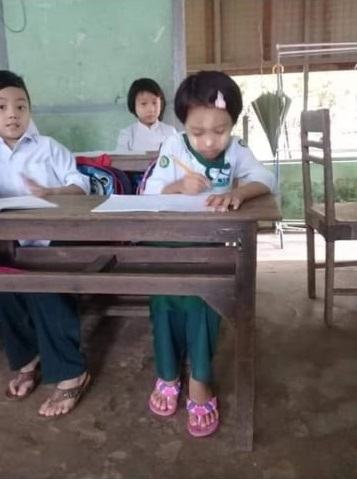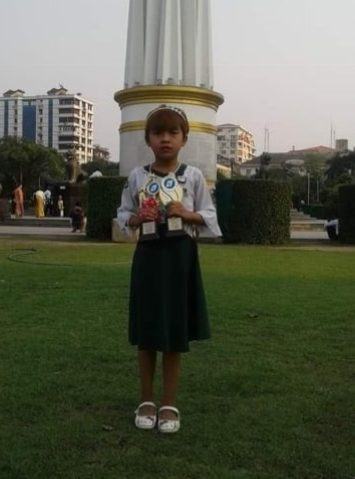Yoon Wa Dee Htet is a girl with intellectual disability. She is the eldest child in her family, in which there are five family members including her. Her family members are grandmother, mother, father, younger brother and her. Their family’s income is mainly from the work of her mother who is an employee of the Electric Power Corporation (EPC), besides that, her father distributes drinking water in their living area. Her father takes care of her during the weekday and her mother could only take care of her at the weekend.
Assessment before intervention
Her disability was at the severe level when she was enrolled at the first time. ECDC* made an assessment and observation of her based on the domains of holistic child developments, when she was enrolled. According to the result of the assessments and observation, she was so poor in communication skill. She could not communicate with the other words. She just showed gestures for communication. She was not able to well express what she wanted until the other understood what she meant. Therefore, to tell what she wanted, she took the person near her to the thing what she wanted.
Regarding understanding skill, she did not understand easy instructions like: take and have snacks, drink water by taking the cup, take on and off clothes, take off her shoes and place them on the shelf, take the backpack and place it on the shelf. Concerning her social skill, she played alone and did not know how to adapt to be flexible with the others.
Cognitive skill is the one she needed the most. She knew just her name; her concentration was so poor that she was interested in toys just for a few seconds. She did not have eye contacts. According to child nature, children complain to their teacher or parents about something unsatisfied, which other children do. She did not know about doing it. She did not know how to response when other children found faults
Selected interventions
When she arrived at school, she cried and run around the classroom. Her class teacher tried to build a friendly relationship with her by following and talking with her so that teaching activities could be started. She gave her lessons and learning activities that built self-confidence. She was asked to practice sitting for 5 minutes, and then 30 minutes, then 1 hour.
For eye-contact improvement during her learning period, the teacher put the position at the same level of her eyes. To get eye contact from the child, the teachers took actions for instructions in high volumes, producing her voices and using toys that produce lights and sounds. It was that the teacher tried to take her eye contact through sounds and lights. For the purpose that the child could have eye contact with what she was doing, she was asked to put balls, toys, puzzles and small materials like balls into a box with a hole.
To improve copy skills, teachers carried out singing songs and taking some actions and asked her to do it as the teachers did. For the purpose that the child could speak out words by lip reading, the teacher read her stories and poems, singing songs and telling teaching aids that were used in teaching. Mouth movements were taught by using tiny pieces of cotton, paper and tissue. The teacher taught the child by linking words with pictures for single word, and the two words.
Her significant achievements
At the moment she can do intercommunication with the others by using words. She could tell what she wants and complain when her classmates beat or she has something unsatisfied. As her social skill improvement, before she received services at Eden Centre, she did not respond to the others (other teachers or her classmates’ parents) in polite ways except from her teachers. She used rude words. Now, her responses to the others become polite and social. In addition, she began playing with the other children. She understands that she needs to wait for her turns when she plays with the others.
As cognitive improvements, she has known the names of her teacher and friends. She can choose and match the same colors, shapes into materials. Her social awareness is improved a lot, she knows that when she meets her friends and teachers, she must greet them. Her improvement in reading and writing is still limited, she can only read sample basic words in Burmese and English and do basic calculation in Mathematics. She becomes more active in daily living.
Parents’ involvement
Her parents accept the current situation of their child and they appreciate her improvements. They send her to school to Eden Centre regularly. They followed whatever the teacher asked to do regarding their child’s exercises. Now, she goes to mainstream school.
*Eden Centre for Disabled Children, Myanmar


